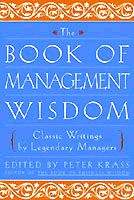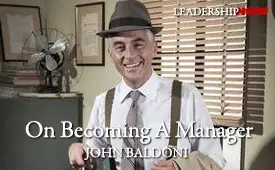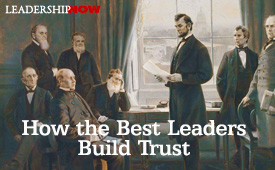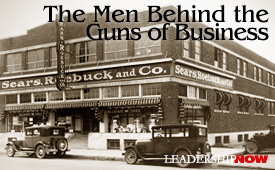
What It Takes to Be a Manager | Reading Room BY JOHN M. FOX |
JOHN M. FOX
As founder of Minute Maid, best known for its orange juice, John Fox had to manage through more than a few downturns, including bad harvests, bad investments, and depressed markets. Still, he built such a respectable company over 15 years that Minute Maid merged with Coca-Cola in 1960. Early in Fox's business career, entrepreneurship was not on the horizon. After graduating from Colgate University in 1934, he took a sales job with IBM. Nine years later he was a branch sales manager with his eye on a vice presidency position; however, corporate life was turning out to be less rewarding than he hoped. To truly prove himself, Fox wanted to build a small business from the ground up, so he resigned and hooked up with a group of engineers dedicated to developing commercial uses for scientific discoveries. At the time, they were looking for someone to head a small company called Vacuum Foods that made orange juice concentrate and powder. Fox spearheaded the search and then elected himself. The early years were tough as Fox dealt with undercapitalization and constant threats of bankruptcy. To introduce the new product, advertising was crucial, and that alone ate up a huge chunk of money. Fox changed the name of the company to the more consumer-friendly Minute Maid in 1945 and became the industry leader. Tough times hit in December of 1957 when a freeze struck Florida, threatening orange groves, and Wall Street beat up the company until its stock was trading at a mere 4 3 Ú8 , a nine-year low. To save his ailing company, Fox moved the headquarters from New York City to Orlando; converted salesmen into brokers working on commissions; sold off expensive suburban Florida property to purchase more affordable rural land for groves; and used innovations to save most of the crop. Ten months later the stock was trading at 18, and two years later the company merged with Coca-Cola. In What It Takes to Be a Manager, Fox provides his blueprint for success, and naturally his first prerequisite is Creative Ability. Toward that end, he describes his own experience in tapping the subconscious mind, a power that he believed could be developed. What It Takes to Be a Manager
John M. Fox In selecting this subject I realize I am venturing into dangerous territory. There is very little agreement on the matter—the business school professors rarely speak from experience—merely from observation—and a lofty observation at that since they haven't been troubled with the little problem of "meeting the payroll." The managers themselves are so busy that they rarely have time to analyze just what it is that makes them good managers. What is more, they are by nature realists and their failures and mistakes fog over the elements of successful management that they practice—much of it by instinct rather than planning. To be at all objective about this controversial subject, one must review the three broad phases of management evolution that have developed during our own lifetime. Fifty to seventy-five years ago nearly every company in America was managed by its owner. Some of the most exciting chapters of our industrial history were written by these brilliant, far-sighted and tough-minded men like Henry Ford, [Harvey S.] Firestone, George Westinghouse and their ilk. With the growing need for capital to expand, the ownership shifted to the public. Guidance of the companies remained for the most part in the hands, strong hands they were too, of such giants as T. J. Watson of I. B. M., Sewell Avery of Montgomery Ward, Walter Chrysler, and hundreds of others, many of whom are still running a good show in their respective companies. But a one-man show. As our businesses have become more complex with the need for special knowledge in production, taxes, marketing, engineering and finance, the scope of running a company widened to a vista beyond the ken of any one man. The team management idea was born. It is perhaps best exemplified by General Motors—one of the earliest and probably still the most successful proponent of this scheme. The team concept has some very real hazards, however. The very need for specialization has had the tendency to produce men who have a kinship to finance or sales or production. This often develops an over-emphasis of their specialty to the detriment of the whole operation. This was exemplified in the recent book and movie, "Executive Suite." Here we saw the company controller, who had gone "overboard" on the importance of the financial scoreboard side of the business. As the war ended, our managements awoke to the great need and the great lack of qualified top management men. Executive development plans became a fad—nearly every major company had one. "Job rotation" became the watchword. Advanced management courses at the universities were in great demand, and still are. I am not in any way belittling these efforts—some have proven very effective. Others have failed miserably. You all probably know examples of each. There is emerging, however, a feeling that finding our leaders of tomorrow is more fundamental than merely appointing a group of "crown princes" who may or may not have what it takes to be good managers. It was my good fortune to attend a roundtable conference at Columbia recently. The subject of the discussion that took place one evening a week for two months was "Management of Expanding Enterprises." The topic that came in for a heavy concentration of study was this one of selecting and training the men who could successfully manage a growing enterprise. From the statements and convictions of this group of successful operating executives, plus some additional observations of other business leaders who have demonstrated their ability to field competent management teams, I have extracted six fundamental qualities that are found or should be present in men destined to command in business. This list I'm sure is not complete. I must hasten to point out that all of these qualities are rarely, if ever, found to their fullest in any one man. Such a paragon of perfection probably does not exist. The list may be useful, however, to anyone who wants to climb high on the management ladder and who is willing to pay the price that the climb exacts. The first qualification is CREATIVE ABILITY. Business is looking for men who can think. There are many synonyms for this quality. It is sometimes called vision—also imagination. Whatever the handle, remember that nothing starts without an idea behind it. It is the lifeblood of an organization. It is a must for success. It is an essential of all growth. To be a good manager, the ability to think creatively, constructively and clearly is essential. The leadership role in management calls constantly for resourcefulness. The fast moving, continually changing pattern of the modern competitive business world demands this quality if success and satisfactory profits are to be the goal. There are many misconceptions about this ability to have ideas. One of the most outrageous statements on the subject that I have ever heard came from a professorial friend of mine who said that a man should change jobs and preferably businesses after he had produced ten good ideas. Quite to the contrary, it is well recognized now that the brain not only never tires, it actually becomes more productive and efficient with use. Moreover, no one has yet been able to utilize more than a small fraction of the potential in his brain. The ability to think creatively can be developed. One of the greatest aids to this worthwhile pursuit is the faculty of turning loose the tremendous thinking power that is latent in every one of us. This is the use of our subconscious minds. Those of you who have learned to tap this great human resource know its tremendous value. For those of you who have yet to experience the wonder of having the solution to a knotty problem reveal itself to you as you are shaving in the morning or at some other unheralded and unplanned moment, one of life's greatest thrills still lies ahead. Remember above all that your superior is expecting you to bring him solutions—not problems. My own first such experience took place early in my sales career with I. B. M., and before I had heard or read anything about the subconscious mind. I had sold my first installation of tabulating equipment to a textile firm in New Bedford—the Wamsutta Mills. I'm afraid that in my great anxiety to make that ice-breaking sale I oversold the customer rather shamefully. It wasn't until the machines were delivered and the installation of the accounting system was under way that I awoke to the fact that I had promised results that the machines were not designed to produce. I spent several anxious, then panic-stricken, days trying to make the equipment live up to my claims. Finally, nearly at the end of my rope, and quite seriously wondering if I would be fired when Wamsutta learned the truth and the machines were sent back, I spent one whole evening at the New Bedford Hotel recapitulating and reviewing the elements of the problem. With no glimmer of an answer, I went to bed—exhausted and completely discouraged. The next morning as I was sitting in the bathtub, the answers to my problem started to come to me as clearly as if they were being written on the tile wall around the tub. I jumped out and without bothering to dry myself hastily wrote down the procedure that had seemingly just popped into my mind. Without wasting time on breakfast, I tore down to the Wamsutta office—punched up the cards needed to test the program and started up the machines. It worked exactly as I had visualized it and exactly the way the Wamsutta people wanted it! Many years later I learned that this was a demonstration of my subconscious mind at work. I learned that it is best to feed the elements of a problem to your mind just before you retire. Then while you are in repose that night or perhaps after several nights, the solutions will come to you—almost like magic. And, what is much more important, the solutions will represent clearer and sounder thinking than you can usually produce with your everyday conscious mind. The old axiom of "Let's sleep on it" is based on this power, and I heartily recommend it to you as a valuable tool in your management kit. Just a few other thoughts on creative ability. Be curious—ask questions—keep an open mind to the other fellow's ideas—and listen—by all means learn to listen! Remember above all that your superior is expecting you to bring him solutions—not problems. The second characteristic to be looked for is JUDGMENT. Webster defines this somewhat elusive quality as the "ability to judge justly or wisely, especially in matters affecting action." It is also described as "good sense." Men who are destined for leadership must be men who can make sound and wise decisions. This sound-thinking qualification goes hand in hand with the previous creative thinking attribute. Sheer brilliance of innovation and invention can be disastrous without a counterbalance of common sense. I had a superior early in my sales career who was quite famous throughout the company as a trainer of men. He had an impressive record of raw college graduates who had started under his tutelage and had become high producers and often good managers in a remarkably short time. A pet aversion of his was people who would not use their heads. Instead of solving our problems for us when we would come running into his office with some headache that had us licked, he would tell us to turn around and read out loud the sign tacked above his door. This sign read, "AS A LAST RESORT USE COMMON SENSE." There have been countless examples of great, earth-shaking fiascoes that came about because someone in a key position failed to use good judgment—forgot the fundamentals of simple common sense. The inventor of the modern self-service store, Clarence Saunders, fell into this trap not many years ago. After his spectacular success with the Piggly Wiggly Stores, forerunners of all of today's supermarkets, he went overboard for the completely automatic grocery store. He called it the Keydoozle Store. His dream store worked something like this. As the customer entered, he was handed a little metal gadget that looked something like a pistol. The merchandise was racked around the store on display as single units each behind a glass panel. Under each item there was a keyhole-like aperture into which the customer poked his pistol-like key. He would pull the trigger once for each item he wanted. This action would record on a punched tape the price of his purchase and set up the behind store machinery to assemble his order on a conveyor belt. By the time he had made his selections and would walk to the cashier who would run the tape from his hand machine through a computer, the entire order would be assembled and boxed and waiting for him in the front of the store. Quite an idea! No pushing carts around a block-sized amphitheater. Space would be conserved. Time would not be wasted waiting in line to check out. Labor would be saved because hard-to-maintain mass displays would be eliminated. In principle it was great, but the idea was a huge flop. Why? It took more maintenance men to keep all the machinery running than any store operator could afford, and even then it would invariably break down on Fridays or Saturdays during the heaviest shopping hours. The chaos that resulted made it a joke. This sign read, "AS A LAST RESORT USE COMMON SENSE." Is judgment something people are born with? I think not. I go along with an old college professor of mine who once lectured my class on how to develop judgment. It was his advice that we should take every opportunity that presented itself to practice and exercise our judgment. He recommended that we study public issues currently under discussion in Washington. Read all we could about them. Read the commentators' and columnists' opinions, but reserve our decision until we had gotten both or all sides of the argument. Then carefully weighing the evidence, the facts and opinions that we had uncovered, we should make up our minds on the issue. We should write down our considered position on the matter. Later, when time had finally brought the right answer to light, as it nearly always does, we should compare our position with what turned out to be right. "This practice, if started early enough in life, and continued for as long as you live, will develop our wisdom without paying the price of expensive mistakes," my professor said. I didn't follow his advice for very long, but I wish I had. A final thought: on this matter of sagacity. A negative, fault-finding approach is not a substitute for judgment. Every new idea can be killed at its birth by a superior who can see nothing but the reasons why something won't work. Enthusiasm and a positive attitude are an important part of the balance required of a leader whose judgment and decision making activities will be tested from the day he assumes important managerial responsibility. The third qualification that seems to be generally considered essential in a manager is ADMINISTRATIVE SKILL. The good executive must be able to foresee the needs of his operation—to forecast its requirements in men, in materials, in money, and in time. He must have the talent to resolve these needs into a practical and understandable program. Modern day business must have men who can plan. This is the unglamorous side to the manager's job. It requires a painstaking concern over a multitude of details; it requires more than a little "i" dotting and "t" crossing; it requires concentration and vigilance—and, above all, it requires an orderliness of mind and method. In my opinion it is an area where many otherwise top executives are the weakest. In the pressure and pace of daily operating affairs, it becomes a problem for many to find time for the planning and thinking out of the projects that have been created and decided upon by our fertile minded and decisive executive types. This failure can be, and often is, the graveyard of many worthwhile ideas with great subsequent waste of dollars and hours. Our forefathers may have been able to operate on the "opportunistic" basis. The growth of our economy, the unlimited natural resources, and the vast untapped markets permitted and actually, in many cases, called for the fast-moving, crapshooting business swashbuckler. Times have changed. The difficulty of creating capital wealth because of the tax structure and the competitive complexion of our current economy does not permit much lee-way for such waste of either money or time. As I said, one of the outward manifestations of this quality is orderliness. The way a man marshals his thoughts, the way he presents his arguments, the way he plans his own life, the way he keeps his working quarters—these are signs of an orderly mind—or lack of it. Omitting the infrequent, unforeseeable emergency that can throw a curve into any of our personal lives, the good manager lives within his income, and finds ways in spite of today's inflated living costs to protect the financial security of himself and his family, to provide for their health and well-being and to spare himself the mental anguish of not being able to make ends meet. This calls for a real measure of sacrifice in most cases, and a family decision to deny itself many of the material enticements with which our society abounds. The fourth quality that the Columbia seminar felt was important was a POSITIVE ATTITUDE. A manager must be optimistic—he must radiate confidence and enthusiasm. The business world of today and tomorrow wants leaders who can inspire. This failure [to plan] can be, and often is, the graveyard of many worthwhile ideas with great subsequent waste of dollars and hours.This positive approach cannot be a manufactured or an artificial one. It must not be merely a pose—it must be sincere and deeply felt. A company, an operation within a company, a project within an operation, must be led by a manager who has an all-abiding faith in his work and objectives. This over-riding belief is usually the secret weapon against the discouragement of difficulties and problems. The behavior of the manager, his facial expressions, even the droop of his shoulders are all watched closely by the rank and file of employees. A discouraged and despondent executive can send a hundred or more employees' morale into the gutter. A worried looking boss can touch off a wave of fear rolling throughout an organization that starts a chain of resignations among the best people and work slowdown among nearly all of them. You can properly ask how does a man go about developing this positive, optimistic attitude. With the problems of government regulations, taxation, cutthroat competition, strikes, personnel failures besetting him daily, most modern managers face enough grief to cause them to commit suicide once a week. How do some men develop the ability to relax in the midst of constant pressure and trouble? An important key to the answer to this question is health. Vigorously good health is a must if a manager is going to keep up with the pace demanded by managerial responsibility. This means proper eating habits, care against overindulgence in smoking, drinking and eating, adequate rest and exercise. A sick or half-sick manager is a real handicap to a company. All work and no play usually produces a tense and grim executive. Hobbies and outside interests actually result in a man having greater capacity and vigor in his professional role. Vacations are necessary—and no company should permit its key executives to get so swamped that they feel guilty for taking time off. It is not easy to develop this ability to stay undisturbed when things around you are going wrong. The jokes about the ulcer incidence among business managers is no joke. Our country's consumption of aspirin is a national disgrace. Another important weapon against worry and pessimism is FAITH—faith in the people to whom you have assigned an important job, faith in yourself, faith in God. People more often than not live up to the faith that they know you have in them. You yourself will more often than not do a good job if you believe you can. There is a little prayer that could be labeled "The Manager's Prayer" that goes something like this: "Oh Lord, give me the serenity to accept with grace those things I cannot change, The courage to work and fight for those I can, And the wisdom to know the difference." A discouraged and despondent executive can send a hundred or more employees' morale into the gutter. A worried looking boss can touch off a wave of fear rolling throughout an organization. In this same vein, I should like to tell you of an experience that I had during the early days of the company. It happened in the winter of 1947. Our problems had become seemingly insurmountable. The new "mousetrap" we had brought to the world had laid a giant egg—nobody, but nobody, was beating a path to our doorstep. Working capital had fallen to a zero level, sales were nonexistent, the frozen food industry generally was on the verge of going broke. As the saying goes, "When the tide goes out, the rocks begin to show." Everywhere I looked there were rocks! At this juncture I decided to attend the Canners Convention in Atlantic City. This was a mistake. My gloom was merely an echo of the gloom I found on all sides down there. Misery loves company and I found a plethora of company that year on the boardwalk. My stomach began to ache—I worried about the stock we had sold to the public—I worried about the employees we had wheedled away from secure, well-paying jobs. I went to sleep—eventually—at night worrying—I woke up early in the morning worrying—I even worried about the sleep I was losing. My family lived in Atlantic City so I was staying with them. Besides, it saved the hotel expense which we could ill afford. One day near the end of the convention, I was asked by my father if I would like to accompany him to a Rotary Club lunch. I had little stomach for this but I knew Dad would feel hurt if I refused. My unhappiness with the decision to go to the lunch deepened when I saw that the speaker was to be a minister of the gospel. My gloom was so abject that I was in no mood for a sermon. This minister was Dr. Norman Vincent Peale, who I soon found out was and is one of America's most inspirational and accomplished speakers. Dr. Peale announced that his subject would be "Tension—the Disease that is Destroying the American Businessman." From the first words he uttered it was as though he were talking only to me. I knew I was the tensest man in the audience. It was a great speech and one that he has told and retold all over this country. The formula he gave for relaxing and putting aside worry I would like to repeat. First, you relax physically. This is done by stretching out in bed or in a comfortable chair. Then you methodically and carefully concentrate on relaxing each part of your body. Start with your scalp, then your face, your neck, your shoulders and so on down until you are as loose as a pan of ashes. Second step—you relax your mind. You recall a pleasant incident in your life—a vacation, your honeymoon, a play, a book, anything that brings back into your mind's eye a pleasant scene. Then finally, you relax your soul. This for most of us businessmen is a little tougher. But it can be done by renewing your faith in the Lord. You get right with God. You check your fears and worries with Him. He can handle them much better than you can. You do this in prayer. If you know no other prayer, the age-old children's one will do quite well, "Now I lay me down to sleep, I pray the Lord my soul to keep." The first thing you know you'll be fast asleep. I know because in desperation I tried it out that very night. I heard Dr. Peale tell about it. It not only worked but I awoke the next morning refreshed and renewed and convinced we would work out of our jam some way. We did. The job of inspiring others also involves some important mechanical skills. You want men who can talk well, men who can write well, men who can be understood, men who can sell people on doing what they want them to do. Some people have these skills quite naturally—most have to develop them painfully and laboriously. How? By practice, practice and more practice. This is why public speaking courses are desirable for an aspiring manager. He should also strive to excel in clear, concise written expression. A large measure of his success will depend on his ability to communicate. In nearly every business decision someone must have the courage to take positive action without having in hand all of the facts and data necessary to make that decision risk-free. To wait for all of the necessary information can mean missing an opportunity, can mean a more aggressive competitor will take the important initiative, can mean a timing failure. Timing in business affairs is vital. So usually someone, a manager with courage, must stick his neck out and decide to do something—now! It takes courage to delegate. To give a subordinate the authority to perform a function, to stand aside and let him make a decision—a decision that may turn out to be wrong—takes valor. It is a fundamental precept of business management that although the work load may be distributed down the line and many decisions may and should be made down the line, the final responsibility for the success of an operation cannot be delegated. The results of a departmental decision cannot be ducked by the department head; the performance of a division is the responsibility of a division vice president; the deeds and performance, or lack of it, of every individual in a company is the responsibility of the president. A manager can never abdicate this responsibility. Timing in business affairs is vital. So usually someone, a manager with courage, must stick his neck out and decide to do something—now! Since it is a well understood code that a manager must take the blame for the mistakes of his organization—yet at the same time pass on the credit for its success—it defies a man's natural instincts not to review and approve every decision within his jurisdiction. When this happens you have no true delegation. One of the hardest lessons for a manager to learn is to learn to "let go." The courage to delegate is particularly strained when the person to whom the job is delegated happens to be young or relatively inexperienced. I have always liked American Brake Shoe's William Given's term "The Freedom to Fail" as a basic management principle in this matter. Men will not take risks and make decisions if they find mistakes mean dismissal. The climate of a company, set by its top management, must allow for failures in decision-making if there is to be a development of managerial ability within the organization. We learn far more by our errors than our successes, but it takes a courageous executive to encourage this freedom. It takes courage to be tough—to say "no" to requests that come daily to a manager's desk. It's much pleasanter to acquiesce and to be a good guy. But with every important executive position goes the unpleasant task of being a wet blanket when the good of the organization is involved. It takes courage to ask your superior for advice. Many executives have the idea that, once given a responsibility, it will be viewed as a sign of weakness if they admit they are stumped when they are. It always takes courage for a man in an authoritative position to say "I don't know." It takes courage to disagree with a superior. There has been a lot written and even more said about the undesirability of the "Yes" man. Nevertheless, it takes real guts sometimes for a man to say "Boss, I think you are wrong—Sir!" It takes even more guts for a manager to take action without a precedent or company policy to back him up. When a manager is given responsibility it is not for him to complain or alibi. Nor can he wait for a decree from above when immediate action is called for. If the action which his best judgment tells him should be taken is one that is expressly forbidden by policy or instruction from higher management, then the executive should try to get clearance for a change of the policy. When there is not enough time for the clearance to come through, he has to take action and explain or defend it afterward. A manager is supposed to get things done—this often takes real pluck. Larry Appley, President of the American Management Association, in one of his recent bulletins said: "A principle for the propagation of the Management Species might run as follows: to blend with one's environment may earn survival; to oppose it risks extermination; to control and redirect it ensures progress." The sixth and final quality that I am going to talk about is CHARACTER. Managers must be men of high integrity. The quality of integrity—the honesty, sincerity, the moral posture of a top executive must be unquestionable. This is a common ingredient of all real leaders. They may have the previously discussed five characteristics in greater or lesser degree—on this quality there can be no compromise. Integrity manifests itself in many ways—some quite subtle, I think. When a manager is given responsibility it is not for him to complain or alibi. Nor can he wait for a decree from above when immediate action is called for.Leaders of integrity have humility. President Eisenhower, probably the greatest leader of men in our time, demonstrated this quality the night that he was elected President of the United States. Many of you will remember his words as he stood before his deliriously happy campaign workers, having achieved the top accolade of American life--" We should always take our jobs seriously but never ourselves." Arrogant leaders are short-lived. Arrogant managers may survive because they own the business or have their boards of directors buffaloed. But their companies never attain their full potential because people cannot feel loyalty to arrogance. As Clarence Frances once said "You can never buy an employee's loyalty—this you have to earn." On this same subject Disraeli wisely remarked "Every man has the right to be conceited—until he is successful." The success of every manager is so tied up with the efforts of those around him that he cannot help but be humble if he is a man of integrity. I race sailboats for a hobby—not well, I'm afraid, but enthusiastically. In sailboat racing we have a term known as "Corinthianism" that I believe illustrates this quality of integrity. I had the occasion to demonstrate "Corinthianism" to my children one day a couple of summers ago. The Foxes' boat by some strange fluke rounded the first mark well ahead of the fleet. This was the first time this had ever happened. By an even stranger fluke (the breezes on Long Island Sound are famous for their flukiness) we approached the second mark with our competitors out of sight under our stern. At this exultant moment, father goofed. In rounding this mark the main boom jibed over and struck the buoy a resounding thump—we had fouled out. Arrogant leaders are short-lived. Arrogant managers may survive because they own the business or have their boards of directors buffaloed. But their companies never attain their full potential because people cannot feel loyalty to arrogance. I turned the boat and started home for our mooring. The children who were crewing nearly had apoplexy. "Holy cow, Dad, what are you doing—the finish line is in the other direction!" I explained we had committed a foul and were required to withdraw from the race. "But no one saw us—not even in their glasses could they have seen us!" It took a little while to point out that since we knew we had committed a foul that was all that counted. That is "Corinthianism." To be a manager a man must have the confidence of his superiors that his actions will be the same whether his deeds are subject to observation or not. This is integrity. I think that the development of managers is of tremendous importance—important to our children and the generations to come—important to the free enterprise system—important to our country—important to our precious American way of life. It is a profession of which I am proud to be a member—junior grade. I would be supremely happy if either of my sons or both of them would choose to aspire to and could qualify as managers. 1956 Source: The Book of Management Wisdom: Classic Writings by Legendary Managers, PART I: Essential Qualities of Great Managers. ©2000 Peter Krass (Editor) . All Rights Reserved. Used by permission. |
|
 
The Persistence of Vision MICHAEL MCKINNEY 
On Becoming A Manager JOHN BALDONI 
Communicating with Power: Putting Leadership on Parade KEVIN DALEY 
How the Best Leaders Build Trust STEPHEN M. R. COVEY 
The Men Behind the Guns of Business RICHARD W. SEARS 
The Focus of Leadership MICHAEL MCKINNEY 
Why Leaders Fail MARK SANBORN |
 |
| ||
 | © 2019 LeadershipNow All materials contained in https://www.LeadershipNow.com are protected by copyright and trademark laws and may not be used for any purpose whatsoever other than private, non-commercial viewing purposes. Derivative works and other unauthorized copying or use of stills, video footage, text or graphics is expressly prohibited. |
||